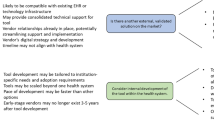Abstract
The emergence of Digital Health Systems (DHS) has had an impact on the understanding of the diagnosis, treatment and cure of diseases. In the case of chronic or long-term illnesses, these systems may improve the disease follow-up. However, these target scenarios also raise specific challenges. For example, due to the long-term nature of treatments, it may be harder for patients to maintain active use of the technology assets, being this aspect key to leverage DHS potential. From a review of the literature, this article analyzes the aspects surrounding patient adherence, to compile a concept model to drive DHS design. The concept model is applied over a DHS focused on patients under a specific health condition (kidney disease) that implies a long-term treatment (peritoneal dialysis). Under this treatment, clinical follow-up and medication adjustment require patients to track daily practical aspects and register health status, to dynamically manage daily life and disease. The availability of granular information also helps clinicians to optimize the judgement of treatment’s effectiveness and counter effects. The result is a DHS that relies on a mobile application and a secure backend server accessible to the professionals in charge of patient management. It is focused on simplifying patient’s data gathering, data continuity and completeness, and meaningful data retrieval and visualization for the parties involved (patient and clinician). The article explains the design process, with adherence in mind, and, as partial validation, an analysis of the user experience of four ‘lead’ users (volunteer patients and practitioners), with a review of the adherence results on the patients’ side.
Access this chapter
Tax calculation will be finalised at checkout
Purchases are for personal use only
Similar content being viewed by others
References
Pillay, R.: Digital Health Trends 2021: Innovation, Evidence, Regulation, and Adoption (2021)
Gong, K., et al.: Mobile health applications for the management of primary hypertension: a multicenter, randomized, controlled trial. Medicine (Baltimore) 99, e19715 (2020)
Debon, R., et al.: Effects of using a mobile health application on the health conditions of patients with arterial hypertension: a pilot trial in the context of Brazil’s Family Health Strategy. Sci. Rep. 10, 6009 (2020)
Paldán, K., et al.: Supervised exercise therapy using mobile health technology in patients with peripheral arterial disease: pilot randomized controlled trial. JMIR mHealth uHealth 9, e24214 (2021)
Devi, B.R., et al.: MHealth: an updated systematic review with a focus on HIV/AIDS and tuberculosis long term management using mobile phones. Comput. Methods Programs Biomed. 122, 257–265 (2015)
Wiljen, A., et al.: The development of an mHealth tool for children with long-term illness to enable person-centered communication: user-centered design approach. JMIR Pediatr. Parent. 5, e30364 (2022)
Bonini, N., et al.: Mobile health technology in atrial fibrillation. Expert Rev. Med. Devices 19, 327–340 (2022)
Kelders, S.M., Kok, R.N., Ossebaard, H.C., Van Gemert-Pijnen, J.E.W.C.: Persuasive system design does matter: a systematic review of adherence to web-based interventions. J. Med. Internet Res. 14, e152 (2012)
Sieverink, F., Kelders, S.M., Gemert-Pijnen, V.: Clarifying the concept of adherence to eHealth technology: systematic review on when usage becomes adherence. J. Med. Internet Res. 19, e402 (2017)
Wong, C.K., et al.: Artificial intelligence mobile health platform for early detection of COVID-19 in quarantine subjects using a wearable biosensor: protocol for a randomised controlled trial. BMJ Open (2020)
Johansson, L., Hagman, E., Danielsson, P.: A novel interactive mobile health support system for pediatric obesity treatment: a randomized controlled feasibility trial. BMC Pediatr. 20, 1–11 (2020)
Murnane, E.L., Huffaker, D., Kossinets, G.: Mobile health apps: adoption, adherence, and abandonment. In: UbiComp ISWC 2015 (2015)
Amagai, S., Pila, S., Kaat, A.J., Nowinski, C.J., Gershon, R.C.: Challenges in participant engagement and retention using mobile health apps: literature review. J. Med. Internet Res. 24, e35120 (2022)
Michie, S., Ashford, S., Sniehotta, F.F., Dombrowski, S.U., Bishop, A., French, D.P.: A refined taxonomy of behaviour change techniques to help people change their physical activity and healthy eating behaviours: the CALO-RE taxonomy. Psychol. Heal. 26, 1479–1498 (2011)
Munson, S.A., Consolvo, S.: Exploring goal-setting, rewards, self-monitoring, and sharing to motivate physical activity. In: 2012 6th International Conference on Pervasive Computing Technologies for Healthcare (PervasiveHealth) and Workshops. PervasiveHealth (2012)
Deng, Z.: Understanding public users’ adoption of mobile health service. Int. J. Mob. Commun. 11, 351–373 (2013)
Nielsen, J.: Usability Heuristics (1995)
Carrasco-Hernandez, L., et al.: A mobile health solution complementing psychopharmacology-supported smoking cessation: randomized controlled trial. JMIR mHealth uHealth 8, e17530 (2020)
World Health Organization: Monitoring and Evaluating Digital Health Interventions: A practical guide to conducting research and assessment (2016)
Zhou, L., Bao, J., Setiawan, I.M.A., Saptono, A., Parmanto, B.: The mHealth app usability questionnaire (MAUQ): development and validation study. JMIR mHealth uHealth 7, e11500 (2019)
mHealth App Usability Questionnaire (MAUQ) for Standalone mHealth Apps Used by Patients. https://doi.org/10.2196/11500
Acknowledgment
Authors gratefully acknowledge the design feedback and participation on trials of volunteer clinicians and patients of Hospital 12 Octubre in Madrid, Spain, and sponsorship from REACT-CM MadridDataSpace4Pandemics Project and UPM Project RP180022025.
Author information
Authors and Affiliations
Corresponding author
Editor information
Editors and Affiliations
Rights and permissions
Copyright information
© 2023 ICST Institute for Computer Sciences, Social Informatics and Telecommunications Engineering
About this paper
Cite this paper
González Bermúdez, A., Bernardos, A.M. (2023). Building Digital Health Systems to Support Treatment Administration: A Preliminary Case Study. In: Cunha, A., M. Garcia, N., Marx Gómez, J., Pereira, S. (eds) Wireless Mobile Communication and Healthcare. MobiHealth 2022. Lecture Notes of the Institute for Computer Sciences, Social Informatics and Telecommunications Engineering, vol 484. Springer, Cham. https://doi.org/10.1007/978-3-031-32029-3_20
Download citation
DOI: https://doi.org/10.1007/978-3-031-32029-3_20
Published:
Publisher Name: Springer, Cham
Print ISBN: 978-3-031-32028-6
Online ISBN: 978-3-031-32029-3
eBook Packages: Computer ScienceComputer Science (R0)




